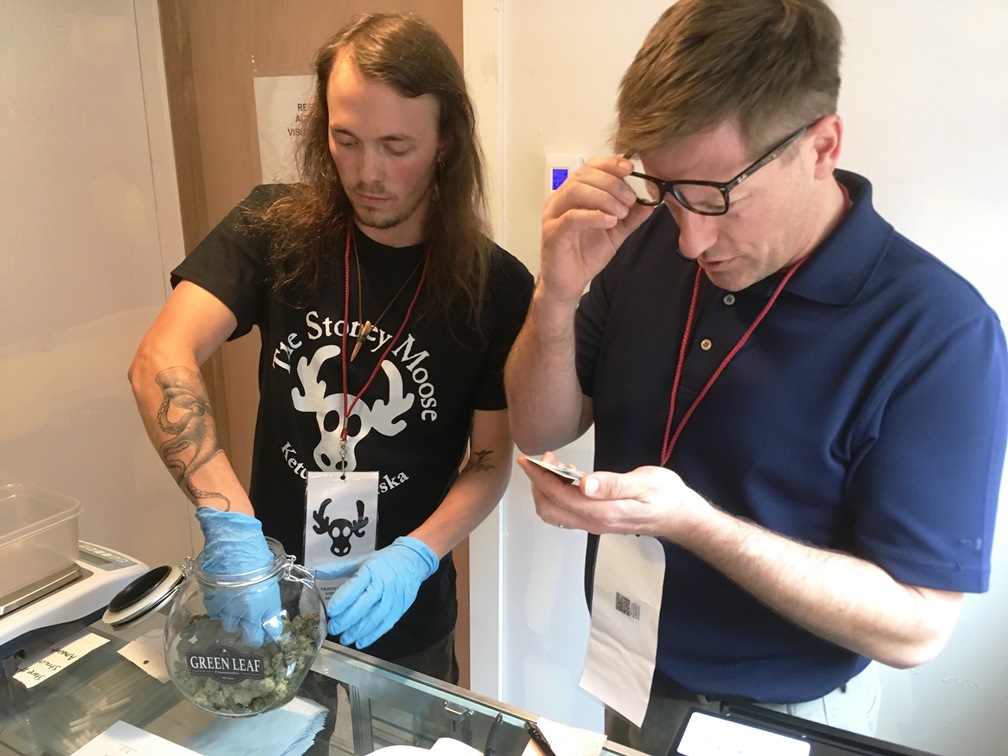
The owner of Ketchikan’s first legal cannabis retailer talked shop at a recent Chamber of Commerce luncheon.
The Stoney Moose first opened its doors in Ketchikan in spring 2017. Since then, co-owner Mark Woodward says business has been booming locally and statewide. Consumers spent $130 million on marijuana products last year. That means $10.8 million in state tax revenue.
At a recent chamber event, he explained how his industry is taxed differently than the Lower 48.
“We charge the growers an in-tax fee based on two types,” says Woodward. “You have the bud that gets into our store like you see here, and then you also have stuff that goes to concentrates, manufacturing, product manufacturing, marijuana, cigarettes, joints—stuff like that—and they’re taxed differently. ”
Since The Stoney Moose opened in 2017, 10 cannabis operations have followed suit. That includes growers and retailers.
Woodward says this is a viable industry in a time when the state economy isn’t the greatest. One of his largest customer groups, he says, are female cruise ship passengers over 35.
“And again, it’s the demographics,” says Woodward. “It’s a lot of people from the south. They don’t have this so what they do is, we find out that they do research on our website so that when their cruise ships arrive, they know where to go when they come down there.”
Not everyone in Ketchikan is enthusiastic about the local cannabis scene. In May, the city council approved a ballot question for the October election. Voters will decide whether or not on-site cannabis consumption should be allowed within city limits.
Woodward says that’s misguided.
Asked Woodward, “Why can’t we have a city council similar to Sitka and Anchorage that actually supports this industry because they see the numbers? What would we do if we didn’t have this industry? Where’s that million dollars coming from just from taxes? I’m not talking about wages, I’m not talking about property taxes and everything else. Where’s it gonna come from?”
He even called out by name city council members he said would like a return to cannabis prohibition.
“It seems like to me, they would end this industry tomorrow if they could,” said Woodward.
At least one of the city council members was there. Janalee Gage has taught a class for people convicted of driving under the influence and teaches substance abuse prevention. She told KRBD the first three years teaching the class, she only saw people for issues with alcohol. But in the last two years, it’s expanded to marijuana.
“I completely understand medical marijuana from every aspect, however, I also see a danger in whether or not somebody’s getting the right dose,” said Gage.
She highlighted potential dangers to public safety.
“When you’re driving and you’re under the influence of a substance, you’re not only risking other people’s lives, you’re risking your own,” said Gage.
Outside the luncheon, Stoney Moose manager Kolbe Rose told KRBD she understands people have mixed feelings about marijuana. But she hopes people will keep an open mind.
“As much as you may disagree with people participating in mind-altering substances, there are people who would disagree with you too,” says Rose. “So, how do we coexist here? And this is obviously something that’s going to happen, how can we make it safe and approachable for the whole community, even if it’s not something you partake in personally?”
About 24 people attended the luncheon held inside the Cape Fox Lodge on July 17. The next chamber speaker will be Alaska Chamber of Commerce president and chief executive officer Kati Capozzi on August 1.








